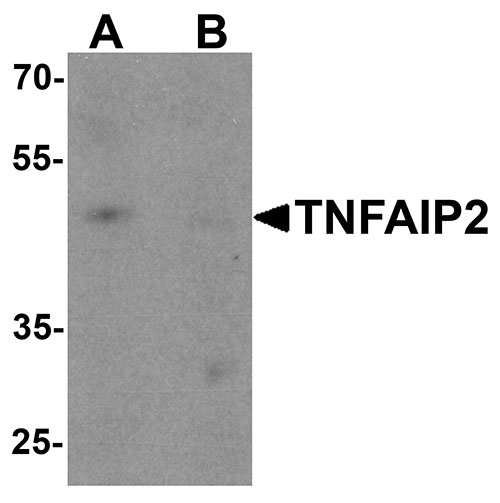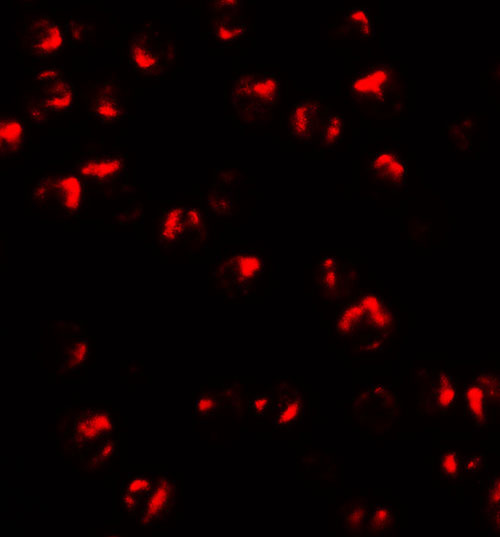TNFAIP2 Antibody
- SPECIFICATION
- CITATIONS
- PROTOCOLS
- BACKGROUND

Application
| WB, IF, E |
|---|---|
| Primary Accession | Q03169 |
| Other Accession | NP_006282, 26051240 |
| Reactivity | Human |
| Host | Rabbit |
| Clonality | Polyclonal |
| Isotype | IgG |
| Calculated MW | 72 kDa |
| Application Notes | TNFAIP2 antibody can be used for detection of TNFAIP2 by Western blot at 1 µg/mL. For immunofluorescence start at 20 µg/mL. |
| Gene ID | 7127 |
|---|---|
| Target/Specificity | TNFAIP2; At least two isoforms of TNFAIP2 are known to exist; this antibody will detect both isoforms. This antibody is predicted to not cross-react with TNFAIP3. |
| Reconstitution & Storage | TNFAIP2 antibody can be stored at 4℃ for three months and -20℃, stable for up to one year. As with all antibodies care should be taken to avoid repeated freeze thaw cycles. Antibodies should not be exposed to prolonged high temperatures. |
| Precautions | TNFAIP2 Antibody is for research use only and not for use in diagnostic or therapeutic procedures. |
| Name | TNFAIP2 |
|---|---|
| Function | May play a role as a mediator of inflammation and angiogenesis. |

Thousands of laboratories across the world have published research that depended on the performance of antibodies from Abcepta to advance their research. Check out links to articles that cite our products in major peer-reviewed journals, organized by research category.
info@abcepta.com, and receive a free "I Love Antibodies" mug.
Provided below are standard protocols that you may find useful for product applications.
Background
TNFAIP2 Antibody: TNFAIP2, also known as B94, is a TNF-a-regulated gene that is expressed in endothelial cells, peripheral blood cells, and mature sperm. Recently, elevated TNFAIP2 expression was observed in nasopharyngeal carcinoma, and high expression of TNFAIP2 was significantly correlated with higher levels of cell migration, invasion and metastasis, suggesting that TNFAIP2 may serve as a useful prognostic indicator for nasopharyngeal carcinoma. TNFAIP2 has also been implicated as part of the viral-sensing circuit of the innate immune response.
References
Wolf FW, Sarma V, Deldin M, et al. B94, a primary response gene inducible by tumor necrosis factor-alpha, is expressed in developing hematopoietic cells and the sperm acrosome. J. Biol. Chem. 1994; 269:3633-40.
Chen LC, Chen CC, Liang Y, et al. A novel role for TNFAIP2: its correlation with invasion and metastasis in nasopharyngeal carcinoma. Mod. Pathol. 2011; 24:175-84.
Chevrier N, Mertins P, Artyomov MN, et al. Systematic discovery of TLR signaling components delineates viral-sensing circuits. Cell 147:853-67.
If you have used an Abcepta product and would like to share how it has performed, please click on the "Submit Review" button and provide the requested information. Our staff will examine and post your review and contact you if needed.
If you have any additional inquiries please email technical services at tech@abcepta.com.













 Foundational characteristics of cancer include proliferation, angiogenesis, migration, evasion of apoptosis, and cellular immortality. Find key markers for these cellular processes and antibodies to detect them.
Foundational characteristics of cancer include proliferation, angiogenesis, migration, evasion of apoptosis, and cellular immortality. Find key markers for these cellular processes and antibodies to detect them. The SUMOplot™ Analysis Program predicts and scores sumoylation sites in your protein. SUMOylation is a post-translational modification involved in various cellular processes, such as nuclear-cytosolic transport, transcriptional regulation, apoptosis, protein stability, response to stress, and progression through the cell cycle.
The SUMOplot™ Analysis Program predicts and scores sumoylation sites in your protein. SUMOylation is a post-translational modification involved in various cellular processes, such as nuclear-cytosolic transport, transcriptional regulation, apoptosis, protein stability, response to stress, and progression through the cell cycle. The Autophagy Receptor Motif Plotter predicts and scores autophagy receptor binding sites in your protein. Identifying proteins connected to this pathway is critical to understanding the role of autophagy in physiological as well as pathological processes such as development, differentiation, neurodegenerative diseases, stress, infection, and cancer.
The Autophagy Receptor Motif Plotter predicts and scores autophagy receptor binding sites in your protein. Identifying proteins connected to this pathway is critical to understanding the role of autophagy in physiological as well as pathological processes such as development, differentiation, neurodegenerative diseases, stress, infection, and cancer.



